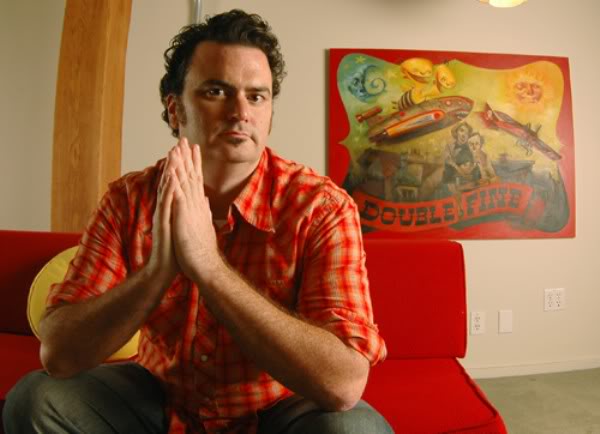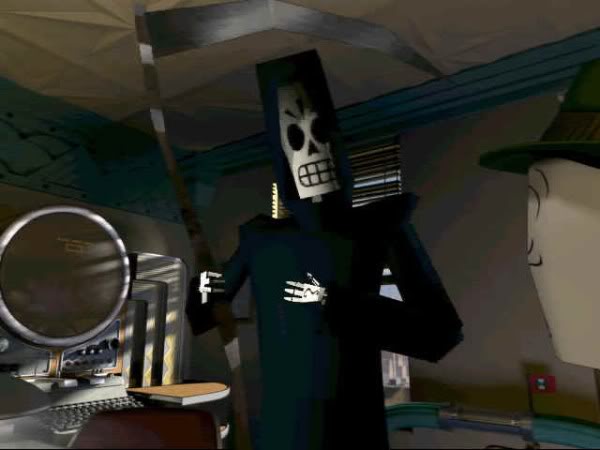This post has not been edited by the GamesBeat staff. Opinions by GamesBeat community writers do not necessarily reflect those of the staff.

It’s unclear if Grim Fandango creator Tim Schafer ever intended to completely change the way games are financed, but his latest venture could have long-lasting repercussions on this hobby we all know and love.
Schafer, who’s one of the elder statesmen of the medium, has chosen to fund his latest creation through private contributions gathered by crowd-sourcing site Kickstarter. While indie developers have been using the popular web destination to find backers for quite some time, it’s highly unusual to see an industry luminary of Schafer’s stature utilizing the service. The pitch was simple: Should the developer and his San Francisco-based crew at Double Fine Productions manage to raise $400,000 in funds before March 13, they would not only create a new point-and-click adventure title, but also allow gamers to see inside the development process with a documentary video series.
That’s all interesting, but what’s really captivating about this whole thing is the response. In about a week, Kickstarter users have already pledged almost $2 million. To say that is amazing is an understatement. There’s an air of excitement surrounding this project, and some industry pundits are already postulating that this could be a “game changer” when it comes to how projects will be funded moving forward…but should the Activisions and EAs of the world lose sleep over it?
Probably not.
There’s no denying that Double FIne has tapped into something with this Kickstarter campaign, but it remains to be seen whether it’s a gaming fanbase fed up with the industry’s status quo or simply a lot of very rabid Tim Schafer fans wanting something new from the man responsible for some of the medium’s most revered titles. Even if we assume the answer to that question lies somewhere in the middle, calling this a “game changer” seems at least somewhat premature.
First off, Double Fine was looking for $400,000 to make a new title. That’s a lot of scratch to most of us, but in the realm of game development it’s pocket change. Schafer says as much on his Kickstarter page, noting “even something as ‘simple’ as an Xbox LIVE Arcade title can cost upwards of two or three million dollars. For disc-based games, it can be over ten times that amount.”
Raising that kind of money is still impressive, but there’s arguably a threshold to the amount of funds one can realistically expect to raise using something like Kickstarter, and I’m willing to bet it’s well below the $30 million of a big budget retail disc release. So, with that in mind, it seems likely that crowd-sourcing will only remain a viable tool for small projects in the foreseeable future. Big-budget titles are still going to need deep-pocketed publishers.

But the bigger question is whether or not we, as gamers, really do want this. I suspect that in the long run the answer to that will be “no.”
In a worst-case scenario situation, it’s easy to see crowd-sourced funding turning into the new pre-order campaign with developers continually trying to sell us on investing in their project in much the same way GameStop harasses us for an extra five bucks every time we try to check out. What’s worse is that games still get made if people don’t pre-order, but developers could constantly hold the threat of not making a title at all over our heads if their funding demands aren’t met. That’s not a good thing, particularly since it forces gamers to invest real money in projects without knowing much of anything about them. Sure, the pitch might be great and the pieces of concept art look cool, but there’s no way of knowing what a finished product will look and play like when it’s not even in the alpha stage.
There’s also the potential issue of “investors.” If a person donates money to fund a product designed to make a profit and that product makes vast amounts of money, does the “investor” have a right to share in those profits? A publisher certainly does – and it’s not a stretch to imagine that people who ponied up the cash to fund Generic Space Marine Shooter #4518 will expect a cut of the proceeds when it pulls in a billion bucks in its first week of release. We’re not at that point now, because this is still a novelty to most people, and no one expects the projects on sites like Kickstarter to make millions of dollars. If we start funding mid-level and AAA titles? That will all change…and so will people’s attitudes and expectations.
None of that even factors in the important services publishers do provide (marketing, public relations, production, etc.) that would now have to be handled by the developer, because the patrons who donated surely aren’t going to come up with TV spots and press releases. Even if those things are part of the funding, dealing with them takes time – time that could be spent making the game better. Publishers don’t always have our best interests at heart, but they do provide some valuable support that developers wouldn’t have in a consumer-funded environment.
The idea of a community where developers are free to be creative and try new things without worrying about publisher bean counters sounds great, and maybe some day we’ll get there. Only time will tell if what Double Fine is trying to do will go down in history as the start of a new era in game development or as an interesting historical footnote. If I were a gambling man, I’d put my money on the latter. What do you think?
